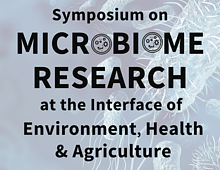University of Maryland Hosts Microbiome Research Symposium

More than 80 people braved stark wintry conditions on January 16 to attend a research symposium at the University of Maryland that explored the world of complex microbial communities.
The Symposium on Microbiome Research at the Interface of Environment, Health and Agriculture joined researchers from the federal government, academia and private industry who are focused on the connectivity between microbes interacting with each other, the environment, agricultural systems, and human and animal health.
Hosted by the University of Maryland Center of Excellence in Microbiome Sciences, the event featured multiple talks, breakout sessions, an engaging poster session, and a networking reception. All the events went off without a hitch, despite 4 inches of snow that closed the university for the day and made travel difficult.
“We were fortunate that more than two-thirds of the people who registered were able to show up and participate,” says Mihai Pop, a UMD professor of computer science who is the director of the microbiome center. “We were particularly pleased by the strong turnout from federal scientists in the region, as well as colleagues from the medical and dentistry schools in Baltimore.”
A morning keynote talk by Susannah Tringe, division director of the DOE Joint Genome Institute at the Lawrence Berkeley National Laboratory, looked at the sequence-based interrogation of soil microbiomes, and how those microbes can benefit various ecosystems.
The afternoon keynote by Joff Silberg, a professor of biosciences at Rice University, was presented virtually as Silberg was unable to fly out of Houston due to poor weather. His talk explored the use of engineered living microbes, and how they might be used to monitor various soil pollutants in real time.
Other talks included how microbial communities can impact coffee growers, the effect of cow manure microbes on farm soil, microbial activity related to women’s gynecologic health, and other topics focused on human gut bacteria and inflammatory bowel disease.
“There’s such a rich diversity of perspectives and ongoing work at the University of Maryland involving microbiome sciences,” says Hannah Zierden, an assistant professor of chemical and biomolecular engineering at UMD and core member of the microbiome center. “I’m excited at the opportunities we have and look forward to continued collaborations—as well as new ones—as we expand our outreach and impact.”
Zierden presented some recent research from her own UMD lab at the conference, which aims to better understand the function of bacterial extracellular vesicles produced by vaginal microbes, and how they might be used to engineer biocompatible therapies for healthy pregnancies.
A large contingent of researchers from the University of Maryland School of Dentistry were onsite for the symposium, including Areej Alfaifi, a doctoral student in the dental biomedical sciences program.
“This event broadened my perspective by introducing me to entirely different aspects of microbiome studies,” says Alfaifi, whose dissertation explores the use of genomic sequencing tools to gain a deeper understanding of the oral microbiome in COVID-19 patients. “Connecting with students and faculty from different schools was an amazing experience that reshaped my thoughts on the field. This meeting was truly unforgettable!”
Additional attendees included faculty, postdocs and graduate students from the University of Delaware, Towson University, University of Maryland School of Medicine, and the University of Maryland, College Park.
Federal scientists in attendance hailed from the USDA, FDA, Department of Energy, and the Smithsonian National Zoo, with representatives from QIAGEN, CosmosID—both major sponsors of the symposium—also present.
The symposium also received support from the University of Maryland Institute for Advanced Computer Studies, Mid-Atlantic Microbiome Meet-up, and the UMD’s Grand Challenges Grants program.
Pop said the UMD microbiome center will help coordinate another symposium in 2025 in Baltimore, working closely with the Institute for Genome Sciences at the University of Maryland, Baltimore to investigate new topics related to microbiome sciences.
“We expect to continue our momentum in this area, which reaches across multiple scientific, medical and policy-related disciplines,” Pop says. “Our belief is that the basic unresolved questions involving microbial communities are interrelated—and so are the solutions we’re working on.”
—Story by Maria Herd, UMIACS communications group
